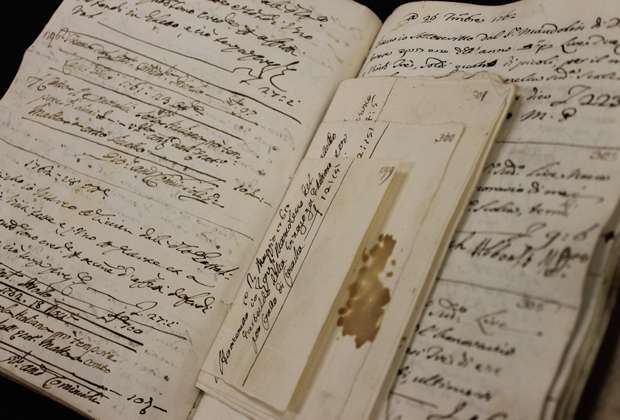Venetian accounts book tells story of 18th-century Jewish community
Grant will digitize, preserve rare piece of history
 Photo/Courtesy of the Robert D. Farber Archives and Special Collections
Photo/Courtesy of the Robert D. Farber Archives and Special CollectionsSoon, the 18th-century accounts book that elucidates the history of the diverse Venetian Jewish community through its transactions will be preserved with a grant from The Gladys Krieble Delmas Foundation.
The book contains records of money lent from the Jewish community to a varied population – communal officials for their salary, emissaries seeking alms from the Holy Land, and non-Jewish artisans who had provided various services to the Italian Jewish community.
“This manuscript represents a significant unusual insight into the realities of Jewish life, primarily in the religious, economic and social realm, in a relatively neglected period in Venetian Jewish history,” says Ben Ravid, professor emeritus of Near Eastern and Judaic Studies, who specializes in medieval and early modern Venice.
The book, Ravid says, is the rare treasure that survives from a once thriving community that attracted Jews from all over Europe and the Ottoman Empire. In fact, four Jewish communities – Italian, German, Levantine and Spanish-Portuguese – coexisted in Venice’s ghetto, each following slightly different traditions.
Few records remained from these communities following the Holocaust, making the account book a “unique manuscript, of which scholars and archives are presumably unaware,” Ravid explains. “Preserving, digitizing, and making it available to scholars worldwide, such as through the website Europeana and its subdivision Judaica Europeana, would constitute a significant contribution for all those interested in Jewish, Italian or Venetian history,” Ravid says.
Sarah Shoemaker, associate university librarian for Archives and Special Collections, says each page of the accounts book will ultimately be photographed, tagged, and translated from Italian or Hebrew into English.
Categories: Humanities and Social Sciences, International Affairs, Research





